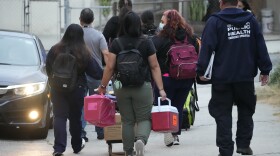A record 2.4 million migrants were apprehended at the southern border in 2023 fiscal year, which ended in September. KERA's Stella Chavez spoke with Muzaffar Chishti, a senior fellow at the nonpartisan Migration Policy Institute about the recent arrival of migrants and what the federal government should do in response.
About a decade ago, it was mostly Mexican males who were coming to the U.S.-Mexico border. That’s not the case now. What’s different?
“That started changing in 2014 when Central Americans became more and more a dominant flow at the border and then we realized that it was not Central American single males, it was Central American families.
What has more recently happened — and I do think that this is much more post COVID — is that non-Mexicans, non-Central Americans now are majority of the people coming to the border. And they’re coming from the United Nations of the world, from Central Asia to Middle East to all of Africa to all of Asia. Chinese and Indians are becoming two of the more of the dominant numbers. No one would accept that even as an observation even five years ago.
Then we have four countries, which is Cuba, Haiti, Nicaragua and Venezuela, and these are four countries with whom we have at best icy relations. So when people say, ‘Why don’t we just, you know, remove these people? You can’t remove people [from] a country you don’t have a diplomatic relation with.”
Something else that’s changed is how states like Texas are taking measures to address the number of migrants coming to the border. Can you talk about that?
“I call it the busing chapter of immigration history. That’s because in the past, migrants would come to the border. They would come to California and Texas and Arizona primarily, but that’s not where they would stay. They would sort of fan out, driven by where their family was. When Abbot started busing people, clearly with a political motive in mind, he not only won the narrative that ‘Look, you’re finally getting the taste of what we see in Texas,’ he changed the political debate in the country.
So you, for the first time, now have northeastern mayors and governors saying we can’t accept everyone. That has changed in six months. So you have skeptical voices on immigration now coming not from Republicans alone but hardcore blue state politicians.
You and other immigration experts have offered ideas that could help with the so-called border crisis. What’s one?
“So what Biden should have done, he should have seized on that and said, ‘Folks, this is a crisis. This is new.’ And instead of this becoming New York versus Texas or Abbott versus Adams, we’re going to accept this as a national challenge.
And we’re going to distribute people. We receive them at the airport. The federal government decides where they go, not Abbott and not immigrants.
We’ll screen them. If they have a relative somewhere, that’s the first place. If they don’t have a relative somewhere, then we will decide where they go, and where they go is going to be determined by the criteria that we use for refugee resettlement.
…because we accept [refugees] in advance. We know who we’re taking. Before they come, we know where they’re going and that’s driven by where the jobs are, where housing costs are low, where cost of living is low. That’s not New York City.”
Got a tip? Email Stella M. Chávez at schavez@kera.org. You can follow Stella on Twitter @stellamchavez.
KERA News is made possible through the generosity of our members. If you find this reporting valuable, consider making a tax-deductible gift today. Thank you.





